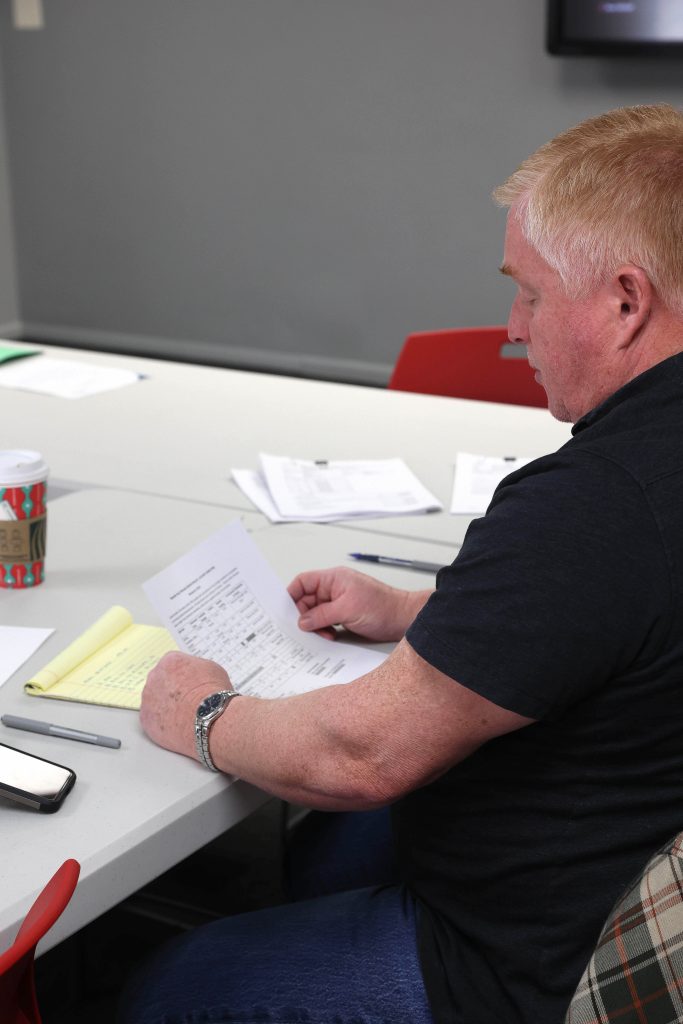In an unprecedented move, managers of the Treasure Valley Reload Center have asked contractors to hold off sending in bills because there isn’t money to pay them. They are owed about $1 million.
The two main contractors, R6 Contracting Inc. and RailWorks Track Systems, finished their primary work at the Nyssa site in December.
“Obviously, you have to pay them once they’re done,” said Brad Baird, project engineer who is president of Anderson Perry & Associates.
But Baird said there wasn’t enough money to cover the contractors’ costs and other bills. He urged the board of Malheur County Development Corp. to let him and Greg Smith, the project manager, “figure who we’re not going to pay.”
He said contractors have been talked into holding their bills since only invoices turned in for payment have to be addressed.
That a public works project would wind up unable to pay contractors is rare and shows the deepening financial crisis facing the rail project.
“They want it paid. We talked them out of that because that would put you past the dollar amount you have.”
–Brad Baird of Anderson Perry & Associates, project engineer
In other developments:
• Project managers now are planning to ask state legislators for another $5 million.
• State Sen. Lynn Findley, R-Vale, is asserting legislative immunity to avoid disclosing records on his role in that request.
• Long-planned parts of the project were recently put on hold. About $2 million in features for the warehouse have been suspended but which ones and with what impact haven’t been disclosed.
• Although no construction work is underway, one development company board member asked for a press release to tell the community the project is not stopped.
• Records indicate that Americold, the multinational company retained to run the rail center, may not be ready to operate it even if the project is finished by this fall’s onion shipping season.
READ IT YOURSELF: Treasure Valley Reload Center Budget Analysis
Baird outlined the status of the project during a meeting of the development company board in Nyssa on Thursday, Feb. 9. He released details that confirmed recent investigative reporting by the Enterprise. Smith, a state legislator who serves on the development company board, participated by Zoom but said little as the bad news spun out. He’s been in charge of the project since 2017.
Baird said the development company doesn’t have the money to pay outstanding costs.
“There are five or six entities that are owed,” Baird said.
Baird said one of the largest outstanding costs results from the practice of retainage. As contractors turned in their invoices in recent months, the development company reduced their payments by 5%, money ordinarily set aside to deal with last-minute problems or flaws in a construction project.
That means in the meantime contractors have to pay wages, equipment and supply bills and then wait sometimes months for payment. Such retainage becomes due when the contract work is done.
By year’s end, the development company owed R6 Contracting $885,000 in that retainage and RailWorks another $235,269.
Baird said the contractors initially agreed “not to ask for retainage yet.”

Officials with R6 Contracting, however, began pressing to collect, Baird said, because “they’re nervous carrying that much retainage.”
The company is a family-owned business based in Union.
“They want it paid,” Baird said. “We talked them out of that because that would put you past the dollar amount you have” in the budget.
“They did want $200,000 because, you know, ‘Got to give us some of it because the work’s done,’” he said.
Baird urged the board not to hold off paying the retainage owed R6 Contracting.
“It wouldn’t really be a show of good faith to R6 since we talked them down to carrying almost $700,000,” Baird said.
Lee Ricker, R6 Contracting project manager, declined comment.
The board voted to pay R6’s latest invoice, including the $200,000 in retainage. It didn’t consider whether to pay the retainage owed RailWorks.
Board member Corey Maag, owner of Jamieson Produce in Vale, didn’t relish the move.
“We’ve always said we’re never going to overspend and I don’t really want to set a new precedent,” Maag said. “I guess the bad part of that is this is spent already.”
Smith had vowed to the board a month earlier that the project team would not spend “one penny” more than it had. Smith gets his $9,000 monthly fee regardless of the development company’s financial troubles because the county has agreed to cover that cost.
Smith didn’t respond to written questions or an interview request regarding the developments.
No board member responded to subsequent written questions from the Enterprise about supporting a practice of leaving contractors unpaid. That included Maag, Grant Kitamura, Kay Riley, Ralph Poole and Smith. Jason Pearson, a director, was absent from the meeting.
Malheur County Commissioner Ron Jacobs, the county court’s liaison to the project, and Malheur County Judge Dan Joyce didn’t respond to questions about whether they condoned such treatment of contractors.
But there may be a cost not yet calculated for holding off the contractors. The contracts with R6 and RailWorks have provisions that the development company must follow state law that requires paying interest on past-due retainage. The development company may be avoiding that cost by asking the contractors to not formally submit bills.
Such a practice appears contrary to Oregon law.
“It is the policy of the State of Oregon that all payments due on a public improvement contract and owed by a contracting agency shall be paid promptly. No contracting agency is exempt,” the law says.
The county-created development corporation is a contracting agency.
Baird also advised board members that their development company may have already overspent what’s left from a state grant that funded the reload center.
At one point, Baird said the development company is “right at or slightly over” money remaining the state grant.
Questioned about how much, Baird said he didn’t know.
He assured the board “it’s not going to be much. If I were to estimate the worst case, it is a hundred or two hundred thousand” dollars in excess of what money the development can expect from the state.
Baird several times told the board that his own company, Anderson Perry, could go without pay for now. The development company is holding at least $51,000 in such invoices.
“Anderson Perry would be fine with carrying our bills a month to two to help you,” Baird said.
The company has a $1.85 million contract for its work on the reload center.
Baird gave the board a one-page “Budget Analysis” that revealed costs continue to climb and the project has no money to proceed on several aspects of the rail project.
One key change was for the cost of constructing a fourth rail spur. Smith and Baird had planned to drop the spur to save money, but that would have violated agreements with Union Pacific Railroad and the Oregon Department of Transportation.
To cover the unplanned expense, the Malheur County Court agreed in December to dip into the county treasury for what project officials told commissioners would be a $2 million rail project. Baird said last week that the work would cost another $425,000 on top of that, which the development company doesn’t have.
He also said that putting up the warehouse building would cost $200,000 more than had been budgeted. He said the building contractor for now would be allocated the original $3 million set aside for the building while project managers worked to find the extra money needed to finish the work. Baird didn’t explain what elements of the building would go undone if the money isn’t obtained.
That work would give the development company only the shell of a building and none of the equipment needed to turn it into a functioning shipment center. Project officials as recently as October said that would take another $3 million. Last week, Baird, chopped that figure in half without explaining what would not be put in the building.
Even with such reductions, Baird told the board, the development company needs another $6.5 million to get Treasure Valley Reload Center up and running.
Baird said the project team was turning to the Legislature to get $5 million. Such funding typically comes late in the legislative session and is not a certainty at this point.
Baird’s analysis showed the project team scheduling work meantime. His analysis referred without explanation to “interim financing” to finish construction by August.
For now, Baird said, “the contractors have all left” the Nyssa site.
Poole, the director who only recently joined the board, said he had been hearing from people in the community “that this project is just stopped. I would like to see that we put out a press release that it never stopped.”
In a later email, Poole explained, “The project has nothing happening currently, but the project will continue this spring, as you well know. I wanted the press release so that all media could report on the project, hopefully in a positive light.”
He chastised reporting by the Enterprise.
“Your reporting has a negative slant toward this project and I don’t agree with your approach toward it,” he said. “This is an amazing project for our county.”


Reporters Pat Caldwell and Steven Mitchell contributed reporting.
Contact Editor Les Zaitz: [email protected].
PREVIOUS COVERAGE:
SPECIAL REPORT: Another state bailout for Nyssa rail project in the works
SPECIAL REPORT: Smith pledges scrutiny of rail project budget, can’t produce one
SPECIAL REPORT: State suspends payments for Nyssa rail project
State’s fund for rail center nearly exhausted but millions in costs remain, records show
Rail meeting canceled after officials meet with attorneys regarding newspaper lawsuit
Rail reload center manager says cash woes may slow progress on project
Findley uncertain of seeking more state money for rail project while Owens stays silent
HOW TO SUBSCRIBE – The Malheur Enterprise delivers quality local journalism – fair and accurate. You can read it any hour, any day with a digital subscription. Read it on your phone, your Tablet, your home computer. Click subscribe – $7.50 a month.

Les Zaitz is editor of Salem Reporter and also serves as editor and publisher of the Malheur Enterprise in Vale, Oregon.










